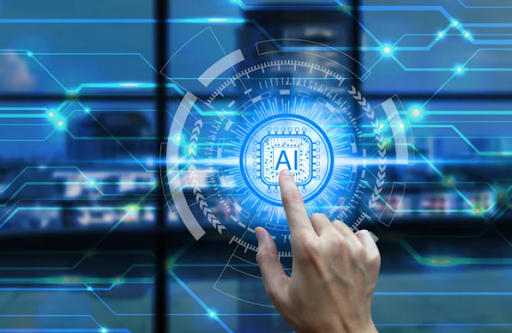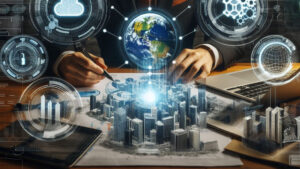Artificial intelligence (AI) has quickly become a crucial component of modern innovation. It powers everything from smart homes and healthcare to self-driving cars and banking. AI is no longer a futuristic concept; in today’s fast-paced digital world, it’s an integral part of our lives, work, and interactions. From the days of simple automation, smart technology has advanced significantly. AI is a key enabler in making electronic devices smarter, more flexible, and more user-friendly. From voice assistants like Alexa and Google Assistant to advanced robotics and predictive analytics, AI is pushing the boundaries of technology. This transformation not only makes life easier but also makes businesses more efficient, sustainable, and personalized. AI-powered smart technologies are transforming global markets and setting new standards for innovation. Understanding how this powerful technology will impact our future is crucial.
AI Enables Smart Homes
Smart homes are one of the most striking applications of AI. They create living spaces that learn how people use them and adapt to their needs. AI-powered thermostats, lighting systems, and voice assistants recognize patterns in their use to ensure comfort and reduce energy consumption. For example, AI can predict when you’ll arrive home and automatically adjust the temperature. AI also enhances security systems with features like facial recognition, motion detection, and predictive notifications. Smart homes with AI make daily life easier, more personalized, and more efficient, saving time and energy costs.
AI in Healthcare
AI in healthcare brings significant benefits to the healthcare sector. AI-powered diagnostic tools, wearables, and remote monitoring systems make it easier to detect illnesses early and provide better care to patients. For example, smartwatches can now measure heart rate, blood oxygen levels, and sleep patterns with astonishing accuracy. AI systems can analyze this information and identify potential health risks, then inform patients and doctors. Hospitals use AI-powered robots to perform surgeries and predictive analytics to monitor patients’ progress. These new ideas not only save lives but also make healthcare more accessible and affordable.
AI in Autonomous Vehicles and Transportation
AI is at the heart of a major transformation in transportation. Autonomous vehicles are transforming the way we travel by using real-time data from cameras, sensors, and GPS to make driving decisions. Advanced AI algorithms control these vehicles. AI makes driving safer by predicting road conditions, detecting obstacles, and reducing accidents caused by human error. Artificial intelligence is also crucial for ride-sharing apps, helping them identify optimal routes, shorten wait times, and improve fuel consumption. Intelligent traffic management systems use AI to monitor traffic congestion and manage it, reducing delays and pollution. The application of AI in transportation enables safer, smarter, and more environmentally friendly mobility options.
AI in Business and Finance
AI and intelligent technologies are also transforming the way businesses and the financial sector operate. AI chatbots can provide instant customer service, while predictive analytics can help companies understand market fluctuations and human behavior. AI fraud detection systems monitor millions of transactions in real time to identify suspicious activity and prevent losses. AI applications can help you manage your personal finances by tracking your expenses, creating budgets, and providing personalized investment advice. Businesses are also using AI to improve supply chains, manage employees, and make data-driven decisions, increasing their efficiency and profitability.
AI in Education and Learning
Smart learning platforms, which can tailor courses to the individual needs of students, are one way the education sector is embracing AI. AI-powered tools can observe how people learn and adapt content to their needs, improving their retention and comprehension. Intelligent teachers and virtual classrooms can provide students with real-time feedback, making learning more engaging. AI can also help teachers process paperwork, grade assignments, and identify student challenges. These new concepts help narrow the education gap, promote lifelong learning opportunities, and make information more accessible to people around the world.
AI and Environmental Sustainability
AI is also crucial for achieving a more sustainable future. Smart grids use AI to distribute electricity more efficiently, reduce waste, and facilitate the use of renewable energy. AI-powered sensors monitor pollution levels, water consumption, and farming practices, providing useful information for environmentalists. AI-powered drones and monitoring systems help farmers maximize their harvests while minimizing their environmental impact. These new concepts demonstrate that AI is not just a technological revolution; it is also a crucial tool in combating climate change and supporting green practices worldwide.
Conclusion
AI is no longer just a tool; it is the key driver of the next generation of intelligent innovation. Artificial intelligence (AI) is transforming the way technology is used in many areas, including homes, healthcare, finance, education, and the environment. It enables systems to adapt, predict, and evolve, delivering better, more personalized, and more environmentally friendly solutions. As AI continues to develop, smart technology will become increasingly important in our daily lives. Not only will machines help us in the future, but they will also anticipate our needs before we do. Individuals, businesses, and governments must now embrace AI-driven smart technologies if they want to stay competitive and ahead of the curve. This revolution is already underway, and its impact will only intensify, making the world smarter and more connected in the coming years.
FAQs
1. How does AI differ from traditional automation in smart technology?
AI goes beyond basic automation; it learns from people’s usage patterns, anticipates their needs, and adapts to new circumstances. This makes products more intelligent and personalized.
2. What are some applications of AI in our daily lives?
For example, voice assistants, smart thermostats, health wearables, self-driving cars, and AI-powered applications that can help you manage your finances or provide personalized recommendations.
3. How can smart technology use AI to improve healthcare?
Working devices, diagnostic tools, and predictive analytics all use AI to monitor health, detect problems early, and help doctors make informed medical decisions.
4. Does the use of AI in transportation actually reduce the risk of accidents?
Yes, autonomous vehicles and intelligent transportation systems that use AI use real-time data to improve road safety, reduce human error, and improve road conditions, thereby reducing the number of accidents.
5. What role does AI play in green environmental protection?
AI is an excellent tool for promoting sustainable development and combating climate change, as it can help people use energy more efficiently, tackle environmental change, and improve agricultural techniques.



